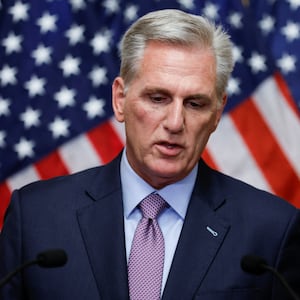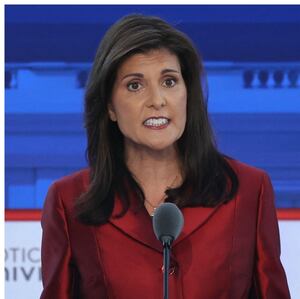Welcome to Trail Mix, a fun but nutritious snack for your election news diet. See something interesting on the trail? Email me at jake.lahut@thedailybeast.com.
This week, we look ahead to the post-Kevin McCarthy money landscape for House Republicans. Plus, a Trump campaign official who was at the Capitol on Jan. 6 resigns, the GOP field's views on a potential late entry from Virginia Gov. Glenn Youngkin, and more.
Kevin cash crunch
For all his flaws, Kevin McCarthy fully earned his reputation for being, as one GOP operative put it, “a money fucking factory for Republicans.”
In the 2022 cycle alone, McCarthy raised over $27 million for his Majority Committee PAC, spending almost all of it on his colleagues—even 14 of the 20 GOP members who fought for days in January to block him from winning the speaker’s gavel.
With McCarthy now relegated to the House Republican rank and file after his historic ouster from the speakership this week, the campaign cash void he leaves behind might be as concerning to Republicans as the literal power vacuum in the House.
Liam Donovan, a lobbyist and former GOP campaign strategist, succinctly described the impact of McCarthy’s removal: “obviously huge shoes to fill, wildly disruptive, terrible timing.”
As if House Republicans didn’t have enough of a challenge trying to defend an extremely narrow five seat majority and a less favorable landscape heading into 2024 after redistricting, cash has also been tight. After the National Republican Congressional Committee reported its lowest fundraising month since 2020, McCarthy infused $2.5 million to make up for the underperformance.
In a perfect encapsulation of how the chaos in the Capitol hurts the GOP’s campaign operation, the NRCC announced after McCarthy’s removal that it was postponing its fall fundraiser—scheduled for Oct. 12 in Dallas—where McCarthy was set to headline.
Depending on the race, House candidates “could expect millions of dollars” for the upcoming cycle to flow from McCarthy’s network, according to a GOP operative who’s worked to secure McCarthy donations for past House candidates.
“Kevin McCarthy used to get up in the morning, go to the bathroom and shit out money,” the GOP consultant said, requesting anonymity to avoid involving any clients on the Hill. “So whoever takes over, that’s just such a high bar to meet. You’ve gotta remember, you’ve got Kevin himself, his campaign account, you’ve got the Congressional Leadership Fund, his PAC that he raises money for, and then the NRCC, which he also raises for.”
CLF, an outside super PAC controlled by House GOP leadership, threw its weight around in the 2022 midterms, spending over $260 million—a significant uptick on the order of hundreds of millions of dollars under McCarthy from its previous stewardship under John Boehner, Paul Ryan, and Eric Cantor during their tumultuous stints running House leadership.
McCarthy’s demise and the downward trend in fundraising this year for the congressional GOP organizations has Democrats salivating over 2024.
“After this week’s chaotic episode, House Republicans have basically upgraded to a Disney fast pass in their never-ending roller coaster ride to the radical right,” Democratic Congressional Campaign Committee spokesperson Viet Shelton told The Daily Beast in a statement. “Donors—both big and small—will no doubt be even less enthused to support this unpredictable, unproductive, MAGA-fied party.”
The NRCC did not respond to a request for comment.
This week’s vote also marked the symbolic end of the “Young Guns” era, referring to a book co-authored by McCarthy, Ryan, and Cantor from the 2010 election, which presented the trio as a new, fresh face of GOP leadership. In a joint interview with NPR a few weeks ahead of election day, Cantor identified as the leader, Ryan the thinker, and McCarthy the strategist.
McCarthy’s role as the strategist became subsumed into both the leader and whatever was left for the thinker, but Republicans also credit him with having an underrated skill set as a candidate recruiter. The California Republican, a political obsessive with a deep feel for specific districts, was known to relish the process of fielding the best candidates to challenge Democrats.
The former speaker has already recruited a class of candidates to run in 2024 in a range of competitive districts, from Lincoln Riley in California’s 9th District, John Quinones in Florida’s 9th District, Prasanth Reddy in Kansas’ 3rd District, and Tom Barrett in Michigan’s 7th District.
But with just over a year until election day 2024, a number of Democratic incumbents in competitive districts still don’t have credible Republican challengers. GOP insiders concede that the leadership chaos hits at a particularly bad time in the recruiting timeline.
Several Republicans who spoke to The Daily Beast pointed to Majority Whip Steve Scalise (R-LA) as the Speaker candidate with the best shot at quickly repairing and reestablishing a McCarthy-esque donor network out of the only two declared candidates.
The one in the best standing among the eight Republicans who booted McCarthy is probably Rep. Jim Jordan of Ohio, a staunch Trump ally.
Jordan is a hit on the campaign trail, often drawing bigger applause than most speakers at Trump rallies, but his fundraising prowess isn’t quite as refined—at least when it comes to big donors. He raised just under $14 million in the 2022 cycle compared to $82.2 million for Scalise, though he has a stronger appeal with small-dollar online donors.
“Scalise is best positioned to hit the ground running and scale up what already exists,” Donovan said.
Scalise also has “the advantage on the fundraising because he’s just been doing it” as majority leader, the operative steeped in the House GOP money landscape said. “I'm sure he's probably making that part of his pitch.”
For now, Republicans are quietly waiting to see who has the inside track and can recreate McCarthy’s money network.
“I don't think anyone knows yet” what the impact of McCarthy’s ouster will be, Doug Heye, once a top aide to Cantor, told The Daily Beast.
But Heye sounded optimistic that whoever succeeds McCarthy will, by the nature of the office, be in a strong position to keep the money flowing.
“Kevin was a strong fundraiser,” Heye continued. “It’s part of why he became speaker, and then became a stronger one as speaker, as happens and will happen with whomever becomes speaker.”
Departure lounge
Dylan Quattrucci, the Trump campaign’s deputy state director in New Hampshire who was at the Capitol on Jan. 6, resigned from his post on Wednesday, according to two Republicans familiar with the decision. The Trump campaign did not return a request for comment.
In August, New Hampshire news channel WMUR first reported Quattrucci was present at the Capitol on January 6. NBC News later obtained video of the 26-year-old recording himself outside the Capitol telling police to “go fuck yourself and go hang yourself.”
Come on in, Glenn, the water is warm
Unhappy with what they’ve seen so far, the GOP donor class has an itch they need to scratch.
Despite Trump being the clear favorite to win the party’s presidential nomination yet again, donors have been pining for a new shiny candidate to throw into the pack.
Enter Virginia Gov. Glenn Youngkin, who has spent the year flirting with running for president, seemingly ruling it out, and then flirting with it again.
Youngkin is reportedly set to hold a “Red Vest Retreat”—referring to his signature suburban dad look from his successful 2021 campaign—later this month, a meeting of the minds and wallets for a potentially late entrance into the 2024 race, timed around Virginia’s legislative elections in November.
The governor’s would-be competition—the Trump campaign as well as a slate of GOP rivals already slogging it out in the primary—are, apparently, decidedly ambivalent about him.
“Youngkin is a non-factor,” one Trump-allied strategist told The Daily Beast, noting that it may be late enough in the primary calendar that the governor could have trouble making the ballot in some states.
If anyone would know, it would be the other campaigns that have been grinding for months gathering signatures, qualifying on the ballot, and building the closest thing they can afford to a national and early state operation.
“Given everything that goes into running, jumping into the race in November is just not practical,” a senior aide on one of the rival campaigns told The Daily Beast. South Carolina’s deadline is coming up on Oct. 31, while the ballot has already been set for the third contest after Iowa and New Hampshire—in the U.S. Virgin Islands.
Other state deadlines have passed, such as in Massachusetts, a delegate-rich state where a late arriving Trump-alternative would need to mount a credible challenge.
“We need to really push behind getting [Nikki] Haley or [Ron] DeSantis dialed in and going forward,” a former Trump adviser and New Hampshire Republican told The Daily Beast, “because Donald Trump will lose to Biden, Donald Trump will lose to [California Gov. Gavin] Newsom.”
Other than an opportunity for campaign staffers and consultants to secure another paycheck if their candidate of choice drops out, as some Republicans said they suspect, there doesn’t seem to be much of a clear rationale for Youngkin to enter the race.
“I don’t think Trump would really come at him that hard, because I don’t think he can break 10 or 15 percent,” the Trump allied strategist said.
Notably, Youngkin also rose to power in Virginia during the early stages of the anti-woke frenzy on the right, and before the repeal of Roe v. Wade. Republicans, and certainly many Democrats, believe that his sweater vest act is wearing thin in today’s political climate. November’s elections in Virginia, in which the governor is banking significant capital to win majorities in the legislature, should be a test of his appeal.
Still, despite those warning signs, the movement to draft Youngkin has kept chugging along.
The New Hampshire Republican operative said they’ve been receiving a series of polls regarding Youngkin, such as whether they would support him in a one-on-one against Trump, or against sets of a handful of other candidates.
“He’s gotten involved in politics, he is a sitting politician, but at the end of the day, he’s a baby,” the New Hampshire Republican said of the 56-year-old governor who is not even two years into his term. “So do you want a baby running the country? We already have the old people. At the end of the day, we don’t need anymore people running around thinking their shit doesn’t stink.”
Trying to Make Joe Biden Sexy (Again)
Saddled by low approval ratings and pervasive anxiety about his advanced age ahead of a run for a second term, President Joe Biden and his coalition need to spice things up a bit.
Or so some of his allies believe.
In an effort to bring back the energy Biden’s campaign had coming out of the 2020 Democratic National Convention, the progressive think tank and polling shop Data For Progress thinks they can reinvigorate the president’s political image.
The firm shared their 2024 strategy memo exclusively with the Daily Beast ahead of a public release next week.
The memo presents an interesting paradox for the Biden campaign. The president’s policies, individually, are popular, but when they’re taken together and branded with the Biden name, they don’t add up to the sum of their parts.
“We’re trying to understand who’s hearing about the Biden agenda,” Data For Progress Executive Director Danielle Deiseroth told The Daily Beast. “Who are the people who like certain parts the most? How can we help close that sort of support versus volume gap and where can we meet them, where they are?”
Right now, DFP’s polling shows voters most associate President Biden with student debt relief and the war in Ukraine, not his major legislative victories, including investment in the semiconductor chip industry, infrastructure spending, and lowering prescription drug prices.
One of the most eye-popping findings? More than half Americans between the ages of 18 and 28, if they’ve heard about a part of Biden’s legislative agenda at all, first came across it on TikTok.
Deiseroth said identifying what’s energizing young voters is also a key focus, and based on the historically high turnout among voters that helped protect Democrats in the 2022 midterms, it’s clear something is energizing them beyond climate change and abortion rights.
The job, then, is to take an 80-year-old fixture of the establishment and give his policies a more appealing shine to young progressives who might otherwise stay home.
“The Biden administration has done a lot of really darn progressive things,” Deiseroth said. “I mean, many presidents have come and gone and promised relief on prescription drug pricing, and the Biden administration has actually done something about it. Is that necessarily—I hate to use this word—is that as sexy as talking about things like student loan debt, climate change?”
Get in the zone with Nikki Haley
Of all the GOP presidential candidates thus far, former U.N. Ambassador Nikki Haley has earned the most consistent praise for her debate performances, measured both in post-debate poll bumps and pundit approval.
Something, clearly, had to have fueled Haley’s sharp barbs and pointed insults of her debate stage opponents.
That something: 80s music. A lot of 80s music.
The Haley campaign revealed to The Daily Beast what exactly is on the pump-up playlist she uses to get in the zone before a debate.
Listen in the following order for maximum effect:
- “I Love Rock N Roll” by Joan Jett (1981)
- “Alright” by Darius Rucker (2008)
- “I Want You To Want Me” by Cheap Trick (1982)
- “She’s A Beauty” by The Tubes (1983)
- “Cruel Summer” by Bananarama (also 1983)
- “We Got The Beat” by The Go Gos (1982)
- “Photograph” by Def Leppard (1983)
- “Call Me” by Blondie (1980)
- “Peace Train” by Cat Stevens (1971)
- “Take What You Want” by Post Malone/Ozzy Osborne (2019)
- “Take Me To Church” by Hozier (2013)
- “Jolene” by Dolly Parton (1973)
- “Fast Car” by Luke Combs (2023)
- “Radio Ga Ga” by Queen (1984)
- “American Girl” Tom Petty (1976)
- “Mr. Brightside” by The Killers (2004)
- “Send Her My Love” by Journey (1983)
- “Dancing Queen” by Abba (1976)
- “No One Is To Blame” by Howard Jones (1986)
- “Pour Some Sugar On Me” by Def Leppard (1987)
Off the beaten path
The U.S. Virgin Islands didn’t come to play. Even though their primary will only be worth nine delegates, the U.S. Virgin Islands will go third in the primary calendar after Iowa and New Hampshire on the GOP side, voting Feb. 8, just over two weeks before South Carolina. “With the exception of 1976—when Ronald Reagan challenged an unelected President Gerald Ford—the Virgin Islands has never seen this kind of attention from presidential candidates of either party,” Gordon Ackley, the territory’s party chairman, said in a statement.
Jan. 6 reverberates in Virginia. With their off-year legislative campaign coming up, Virginia Democrats are hitting the airwaves with attack ads on the Republican nominee for a key House of Delegates race, Geary Higgins, who led Stop The Steal rallies ahead of the insurrection.
Meanwhile... Republicans are, despite all of the self-inflicted wounds on Capitol Hill, enjoying their highest approval on the economy since 1991 in Gallup’s tracking poll, which has been asking the question on economic sentiment since 1951.
Campaign lit
Kevingeddon. Sam Brodey and Matt Fuller broke down the historic day of McCarthy’s fall, and the beginning of the House GOP’s next internal conflict.
From the peanut gallery. The courtroom has been the campaign trail for Trump this week, and Jose Pagliery had a great dispatch from Wednesday capturing the former president’s frustration.
Panhandlin’ out stacks. Rep. Matt Gaetz (R-FL) likes to remind people he’s no shill for corporate money, but Roger Sollenberger obtained footage of an “exclusive Zoom briefing” Gaetz held in front of big donors.
Nancy Mace braces for impact. After drawing audible gasps when she voted to remove McCarthy, Rep. Nancy Mace (R-SC) is asking for small donors to help bail her out of tough reelection fight where she might not receive much party support, Meredith Lee Hill and Olivia Beavers report for Politico.
The degree divide. Splits among voters with and without college degrees have become a defining feature of western democracies dealing with a rise in right-wing populist authoritarianism, but in the U.S., the effects run far deeper, the Atlantic contributor Yascha Mounk writes.









